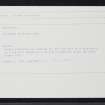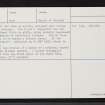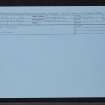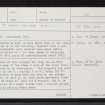Pricing Change
New pricing for orders of material from this site will come into place shortly. Charges for supply of digital images, digitisation on demand, prints and licensing will be altered.
Upcoming Maintenance
Please be advised that this website will undergo scheduled maintenance on the following dates:
Thursday, 9 January: 11:00 AM - 3:00 PM
Thursday, 23 January: 11:00 AM - 3:00 PM
Thursday, 30 January: 11:00 AM - 3:00 PM
During these times, some functionality such as image purchasing may be temporarily unavailable. We apologise for any inconvenience this may cause.
Whiteford
Earthwork (Period Unassigned)
Site Name Whiteford
Classification Earthwork (Period Unassigned)
Alternative Name(s) Bridgend; Riverbank Wood; Pitcaple; River Urie
Canmore ID 18791
Site Number NJ72NW 11
NGR NJ 7235 2624
Datum OSGB36 - NGR
Permalink http://canmore.org.uk/site/18791
- Council Aberdeenshire
- Parish Chapel Of Garioch
- Former Region Grampian
- Former District Gordon
- Former County Aberdeenshire
NJ72NW 11 7235 2624.
(NJ 7235 2624) Earthwork (NAT)
OS 6" map, (1959)
For socketed bronze axe found within this earthwork, see NJ72NW 34.
For nearby cropmark enclosure, see NJ72NW 69.
An old castle is said to have stood here at one time, and foundations of an old building, together with a portion of the earthwork, were removed some years before 1867. The tradition of a Roman camp seems to originate from the visit of a party of archaeologists about 1827.
Name Book 1867.
The remains of this alleged Roman camp lie on flat ground on the edge of the steep N side of the river Urie. The site appears to be triangular. The ramparts are just visible, that on the N, running E to W, being 300 ft long and appearing to have been dug into in two places. The SE rampart, if such it is, runs south westwards forming an angle of about 450 with the N rampart; but it is now in the nature of a scarp rather than a rampart proper. There is clearly nothing Roman here.
O G S Crawford 1949.
This site has been so heavily ploughed that little recognisable remains. The N and W 'ramparts' are two hollows, at least 20.0m in width which probably represent the spread remains of artificial ditches. The SE 'rampart' appears to be merely a natural scarp. Of the southerly 'rampart', indicated on OS 25" map, 1901, there is now no trace. Probably the remains of a motte or a medieval moated enclosure, the ditches isolate a higher triangular piece of land from the flood plain of the river Urie.
Revised at 1/2500.
Visited by OS (RL) 10 March 1969.
Recent ploughing has removed all but the bank on W side which survives to a height of 1.2m with a possible ditch 10m wide.
P Yeoman 1987.
Classified by Aberdeenshire Archaeological Service as moated homestead.
NMRS, MS/712/17.
This site is listed in an Atlas of Scottish History (McNeill and MacQueen 1996) as a moated site.
Information from RCAHMS (DE) September 1997
(Location cited as NJ 7235 2624). Whiteford. Air photography (AAS/88/07/S12/4-9, flown 3 August 1988) has recorded the heavily-ploughed remains of this earthwork enclosure at an altitude of about 75m OD.
NMRS, MS/712/36.
This earthwork, which is situated on a terrace on the N bank of the River Urie some 350m NW of Pitcaple Castle (NJ72NW 10), has largely been ploughed down. Roughly triangular on plan, the defences are only visible on the N, where the line of a broad ditch is marked by a shallow hollow in the surface of a cultivated field measuring about 15m in breadth and 0.5m in depth. On the W, the defences probably followed the E edge of a natural hollow, which measures about 15m in breadth and 1m in depth, while on the SE the interior is now bounded by the lip of the old river terrace, which measures about 3m in height at the SW corner.
Visited by RCAHMS (JRS, SPH), 12 June 1996.














